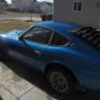Search the Community
Showing results for tags 'camshafts'.
-
I recently rebuilt the engine in my 1971 240Z. The relevant parts: L28 N42 block L24 E88 head (earliest "notched' chamber design) Overbore of 0.030" F54-type flat-top pistons from ITM Isky Racing Stage 2 cam (.480 lift, 280 duration, 232 @ .050 lift duration) New Schneider performance valve springs and hats New rocker arms and lash pads New oil pump for 81 ZX turbo engine As part of the machining the head got a valve job (head already had steel valve seats retro-fitted) and new valve guides. I'm running 91 octane gas (highest we have here in Utah; high altitude) and Valvoline VR1 racing oil. The new camshaft is internally oiled and I installed a new spray bar made for me by Captain Obvious on these forums. Everything in the block was assembled with Permatex's assembly lube while everything in the head got Isky's assembly lube included with the cam. All the bolts and nuts I could find a spec for got torqued to spec. When I first fired her up the radiator was open and had a hose constantly running water. I immediately brought the engine up to ~2000 RPM and let it run for 30 minutes while I monitored oil pressure and temperature. Temp was right in the middle of the gauge while oil pressure was about 80 PSI. She sounded great. A day or two later I took her out for the first drive. Engine revved nicely and was very responsive. I stayed in first gear initially, bringing the engine up to ~3000 RPM and then letting the engine brake the car to help seat the rings. I did this about 10 times, then took her out on the road. Just a minute or two after shifting into second a clunk sounded under the hood. I immediately pulled off the road, popped the hood. The gauges still read in the normal range, but the sound was markedly different and idle was terrible. I head back home when another clunk sounded. I immediately killed the engine and coasted to the side of the road. I tried cranking a few times, but the sound was wrong and the car wouldn't start. Through all of this, no smoke, no leaking fluids, and no extreme gauge readings. The next day I had the car towed home. I pulled all of the spark plugs; none of them show anything unusual and definitely no signs of collision. I pulled the valve cover; camshaft looks good and well-oiled and all friction surfaces appear to be mating nicely. However, the cam timing sprocket had slipped off the cam snout and was no longer engaged with the dowel on the snout. The sprocket hadn't fallen into the abyss of the front cover, but it was riding on the bolt. I didn't see oil at the top of the radiator, and no frothiness in the oil on the dipstick. I figure that the clunks I head were the cam timing sprocket slipping off. I must not have done the final torque to spec on the bolt as I thought I had. I can't turn the cam enough to engage hole 1 on the cam timing sprocket so it appears that the valves and pistons did run at least some interference. However, nothing on the top side of the head shows any signs of trauma. I'm pulling the head tonight and will be pulling the front cover and re-doing the timing this weekend. What specifically should I be checking? I figure the most likely damage is bent valves; what do I need to do to check for this? Any other advice?

